
Micro-dosing psychedelics and mental health.
Continuing with the psychedelic theme, and the potential benefits to mental health have been covered in a previous article and podcast. The key issues were the potential therapeutic benefits of using these compounds.
After all, there was a 40-year pause on psychedelic research following the prohibition of these substances.
There are some cynics and concerns about this method due to the unpredictability of each subject, and one size fits all isn’t available.
The drug’s potency has increased over time, and psychedelics are illegal, so there’s no quality control on supply, and some nasty contaminants, have been found within illicit street products.
There have been reports of adolescents experiencing nightmares or flashbacks after taking psychedelics, which could be attributed to traumatic experiences during a bad psychedelic experience.
Psychedelic drugs may also negatively affect adolescents' brain development, who are still growing and learning to cope with life’s challenges.
Beginning in the 1960s, scientists thought that depression resulted from having low levels of the neurotransmitter serotonin in the brain. Traditional antidepressant drugs, such as selective serotonin reuptake inhibitors, worked by correcting that chemical imbalance.
But there were holes in this hypothesis. Most notably, antidepressives medication could raise serotonin levels immediately, but symptoms of depression typically don’t alleviate until several weeks after starting the treatment. Unfortunately, this drug had unsavoury side effects, such as "emotional blunting" .
A new theory emerged in the early 2000s that depression, anxiety, and Post-traumatic stress disorder may stem from the loss of synapses in the brain.
It turned out that antidepressant drugs could regrow those lost synapses — a process known as plasticity.
It’s possible that by forging new connections in the brain, people can start to change negative thought patterns and regain control over anxious or depressive impulses.
The brains of Buddhist monks and other expert meditators — people intimate with mystical experiences — also undergo changes.
There’s even research suggesting that talk therapy works, in part, by altering patterns of brain activity.
Psychedelics are thought to confer therapeutic benefits by inducing plasticity in the brain.
Micro-dosing psychedelics has long been a subject of fascination to people looking for non-traditional methods of mental health treatment.
But what is micro-dosing?
Could it offer an effective alternative to traditional therapies?
This article will discuss the potential benefits and drawbacks of micro-dosing psychedelics and how to experiment with them safely.
What Is Micro-dosing?
Microdosing involves taking small doses (often around one-tenth of a whole amount) of psychedelic drugs, such as lysergic acid diethylamide, LSD or psilocybin mushrooms, over extended periods. People who use this method report improved mental clarity, focus, creativity, and mood states. It’s often referred to as ‘micro-dosing’ because such tiny amounts are used.
Micro-doses say the substances help them overcome emotional barriers and increase productivity; others claim the experience helps reduce anxiety or depression symptoms.
Mental Health Training
More information in https://mentalhealthtraining.info/